The Just Futures Co-lab acknowledges technologically mediated futures in the plural and as visions and inquiries that are also structurally equitable and socially just.
The Just Futures Co-Lab
Vision
The Just Futures Co-lab acknowledges technologically mediated futures in the plural and as visions and inquiries that are also structurally equitable and socially just. The “co-lab” makes explicit in name and practice the anti-caste, anti-colonial, queer- and trans-feminist processes and politics of collaborative and community-centered knowledge production and project making in and with the digital.
Orientations and Approaches
With an orientation to learn from, with, and alongside individuals and communities along the campus-community spectrum, the Co-lab centers inquiries and connections that respond to and remain rooted in participatory learning, equitable labor, reciprocity, and embodied research across its project spaces. The lab acknowledges how digital technologies aid in social exploitation, surveillance, disenfranchisement, and even epistemic and spatial violence. With an arts and humanities approach to digital research and pedagogy, we produce cultural critiques and model possible alternatives for scholarly and interpersonal care in all such co-productions.
Lab Director and Steward:
Dr Kush Patel (they/them)
Values
Critique: Critiques are material and situated, and critical thinking is possible. At the Just Futures Co-lab, we define scholarly and creative acts of building critique as forms of worldmaking praxis.
Collectivity: The Co-lab functions as a pedagogical space of collective and community-centered learning. The lab’s goal is to scaffold, foster, incubate, and mentor graduate scholarship, as well as ideas and methodologies that may extend into directions beyond the curriculum.
Care: The critiques and pedagogies we produce further care-based relations with the people, lands, networks, and infrastructures that jointly constitute the context in which we live, learn, and hold ourselves accountable.
Inquiries and Project Spaces
The Just Futures Co-lab furthers two interconnected inquiries, namely, Intersectional Feminist Histories and Futures and Critical Digital Humanities Pedagogy. It is in the overlap of these inquiries that I have located the project spaces of Queer Futurities and Futures with the “Peripheries.” Each of these project spaces serve as a home for transdisciplinary research involving graduate students as well as related non-academic and academic partners. The inquiry and project space descriptions are as follows:
Intersectional Feminist Histories and Futures
Discourses on collective speculations, critical research creation, and feminist worldmaking practices dispense with the framework and protocols of design research and innovation, which often operate towards imagining and developing only a particular kind of future globally as a universal, patriarchal, and colonizing force. Instead, the Just Futures Co-lab furthers and remains in dialogue with counter-perspectives of decolonizing its current white, cis-het, able-bodied, upper caste, and settler perspectives, calling for a more just practice that is rooted in local, heterogeneous, and trans-national ways of knowing, living, and thinking about our interdependent futures.
Critical Digital Humanities Pedagogy
Pedagogical practices in and with the digital often involve a preoccupation with tool-based skill acquisition, product-centered learning, and computational research engagements that seldom critique the colonial, capitalist, white supremacist, patriarchal, and upper caste oppressions built into mainstream computer systems and replicated in the field of digital humanities (DH). Critical DH pedagogy is concerned with grounding the discourse on learning with digital technologies not only in these very histories and genealogies of oppression but also related community-centered resistances so that our syllabi, classroom environments, and projects in the humanities can have ongoing accountabilities and just legacies.
Project Spaces: Trans-Disciplinary Research with Postgraduate Students
Queer Futurities and Futures with the “Peripheries”
The space of Queer Futurities asks: What constitutes a queer archive? What is its conceptual, material, and carework form, content, and location? What are the personal, community, and/or institutional dimensions of its construction and maintenance? How might we keep an archive of queer work and history alive and meaningful for queer survival? The work of Futures with the “Peripheries” looks into the ethical and political implications inherent in the production of such technological systems, especially as they relate to questions of accessibility, accountability, protection, and collaboration with individuals and groups whose lived realities and histories may traditionally have been viewed as peripheral to digital life or necessary for disciplinary action and surveillance.
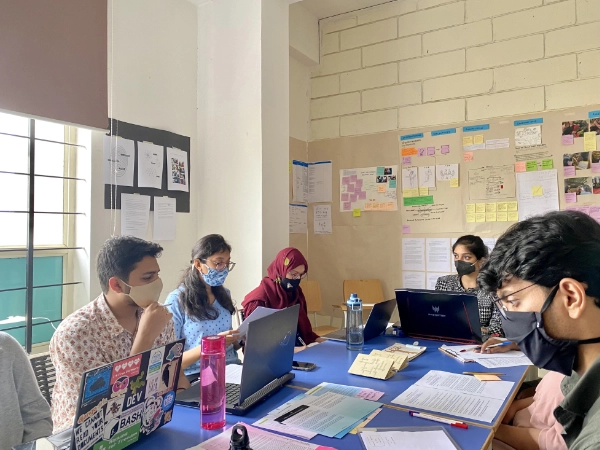
Inquiries into the Futures at the Peripheries Project and Presentation by Vikash Raj (December 2021). Vikash (and Pragya Sinha) produced methodological reflections on elderly individuals’ engagements with and notions of digital technology, or what digital-tech and digital tech-led futures means to them—and in the process, they questioned prevalent terms like the digital native. Image courtesy of Kush Patel
As a space for scholarship and pedagogy, the Co-lab coordinates a yearlong seminar and reading group series to complement and deepen our work. The programming of this series involves graduate students interested in leading with the scholarly dimensions of each project and in working with me to culminate the year with a supporting open-access report, critical art and design information sheets, zines, and/or peer-reviewed publications.
Letters from the Just Futures Co-lab
Felt Notes are monthly dispatches about the work of the Just Futures Co-lab, and the co-labouring worlds of research and teaching in art, design, and the digital humanities that it scaffolds, furthers, and amplifies. The letter writing translates the ever so negotiated nature of this space at Srishti Manipal and the discourse and scholarship on equity and justice that I produce and co-produce with students and non/academic community partners through critical pedagogy; archives and databases; interactive digital storytelling; and inquiries into queer-feminist media technologies and infrastructures.
Each month’s letter carries a set of experiences, initiatives, and announcements related to the Just Futures Co-lab on SMI’s MAHE-Bengaluru campus. A periodic letter to subscribers, I hope, offers an intimate alternative to maintaining an independent site and duplicating the already published information online, structuring notes and ephemera connected to the lab’s core inquiries instead; inviting interests and additions from friends, colleagues, collaborators, and community members along the way; and collating opportunities and announcements for past and present members to access and stay connected.
If you aren’t subscribed yet, you may do so here. If you are already subscribed, I would love for you to share the link with friends and trusted networks as we make sense of our relationships to technology as well as our relationships to each other via technology. If you would like to write or co-write a letter in the future or share any announcements, please feel free to get in touch with me, and whilst you’re here, please also check out the Felt Notes Archive.
Recent Postgraduate Transdisciplinary Research Works & Lab Mentorship
⦁ anu, “Queer Sounds: Questions of Protection and Preservation of Short Digital Lives” (M2024)
⦁ eyeshaan, “Queer Loss: Honoring the Born-Digital Legacy of Queer Intimacies in Rural North” (M2024)
⦁ Krishnapriya, “Queer Non-Profit Organizations: Digital Isolation and Long Pandemic Times” (M2024)
⦁ Namitha Moses, “Karnataka Sexual Minorities Forum and At-Risk Born-Digital Materials” (M2024)
⦁ Ruhani Chatterjee, “Gaymers and Gayming Spaces in India” (M2024)
⦁ Shinjini Asthana, LGBTQIA+ Lives, Expressions, and Mental hHealth Risks on Instagram” (M2024)
⦁ Vepa, “Embodied Making: Transness and Neurodivergence” (M2023, W2024)
⦁ Adrianos Pappas, “Open-Source Software for Queer Archiving: What, Why, and How?” (W2023)
⦁ Vishnu S, “What Does Queerness Look Like to AI?” (W2023)
⦁ Priti Dhongani, “What Does It Mean To Structure A Queer Design Bibliographic Database Technology Around Critical Inclusion?” (W2023)
⦁ Sushrut Baporikar, “A Case Study on Ethical Digitization of LGBTQIA+ Community Archives and the Importance of High-Quality Metadata Practices” (W2023)
⦁ Rutvik Sankhe, “What Is Making In The Frame Of Queer-Nomadic and Anti-Colonial Survival?” (M2022)
⦁ Saee K, “What Constitutes A Teacher-Training Manual for Trans and Non-Binary Lives Inclusion in Schools?” (M2022)
⦁ M. Nithya Kirti, “Cyborg Theories: Queer-Feminist Speculations On The Body” (M2022)
⦁ Gayatri Shanbhag, “Beyond The Gender Binary: What Might Be The Queer-Feminist Reimaginings of Standards, Tools, and Templates In Apparel Design Pedagogies?” (M2022)
⦁ Aditi Bhat, “How Might We Understand Digital Burnout From A Feminist Ethic Of Care?” (M2022)
⦁ Anuvrat Sharma, “What Are The Social And Ethical Tensions In Preserving Digital Legacies?” (M2022)
⦁ Hamna, “What Are The Usability Assumptions Behind CAPTCHA Technologies?” (M2022)
⦁ Shivanshi Gupta, “Questions of Surveillance and Elderly Care In Smart Home Technologies” (M2022)
⦁ Puneeta Kashyap, “Inquiring Into Data Privacy With Wearable Health and Fitness Device” (M2022)
⦁ Mariyah Khorakiwala, “Inquiring Into Notions of Community Sovereignty And Digital-Divide” (W2022)
⦁ Pragya Sinha and Vikash Raj, “Concerns of Digital Interface Design in Everyday Elderly Life” (M2021)
⦁ Ruchika BN, “Gender and Representation in Telugu Films” (M2021)
⦁ Shamanth Joshi, “Building A Bibliography of Sensed Queer Objects” (M2021)
Contact Information
To learn more about the Just Futures Co-lab and discuss possibilities for collaboration, internships, and talks, please contact Dr Kush Patel at kush.patel@manipal.edu
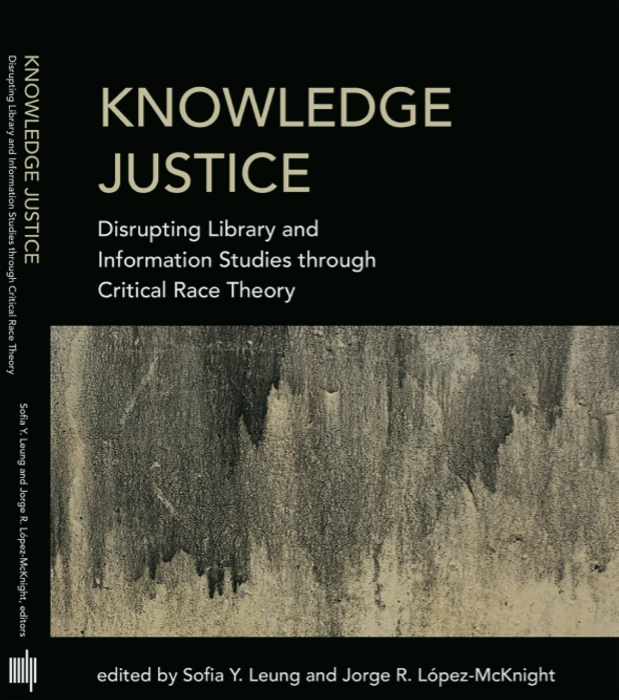
Book Chapter] Anne Cong-Huyen and Kush Patel, “Precarious Labor and Radical Care in Libraries,” in Knowledge Justice: Disrupting Library and Information Science through Critical Race Theory, edited by Sofia Leung and Jorge R. López-McKnight (The MIT Press, 2021), pp. 263-282. Image courtesy of We Here Collective in Library and Information Science
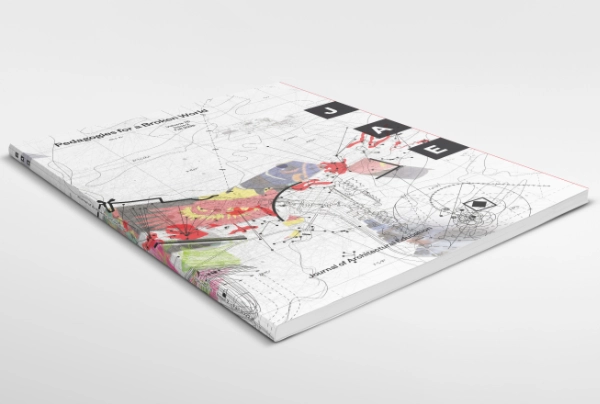
[Journal Article] Kush Patel, Johnson Jament, Merin Mathew, “Framing Survival: Questions of Safe Space in Design Pedagogies” in Pedagogies For A Broken World, JAE (Journal of Architectural Education) 76:2, edited by Jay Cephas, Igor Marjanović, Ana Miljački (October 2022), pp. 190-192. Image courtesy of JAE.
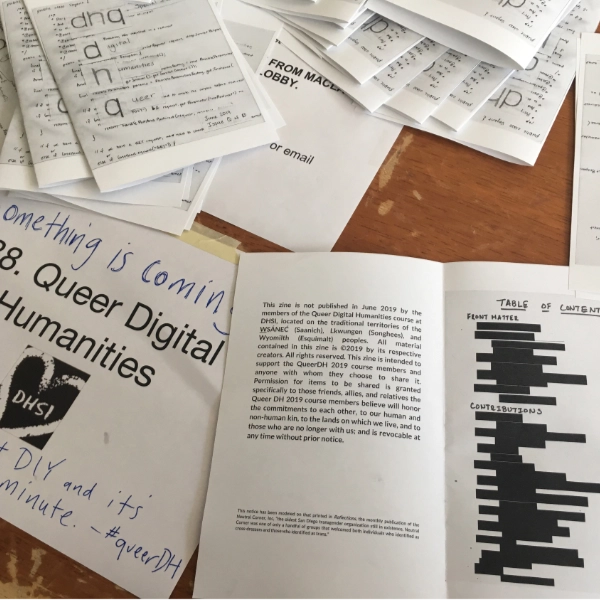
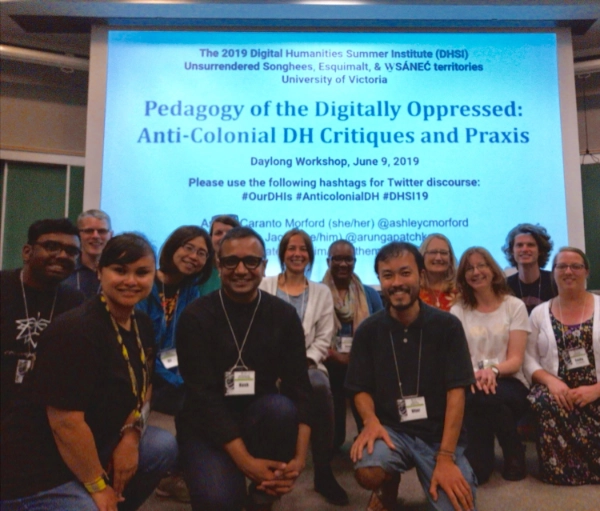
Top and Bottom: Queer DH and Anti-Colonial DH Pedagogy Workshops, Digital Humanities Summer Institute (DHSI), University of Victoria, BC, Canada, 2019. Images courtesy of Kush Patel.
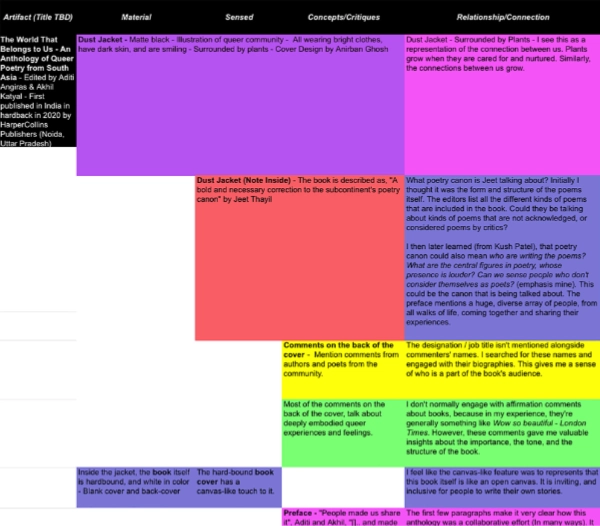
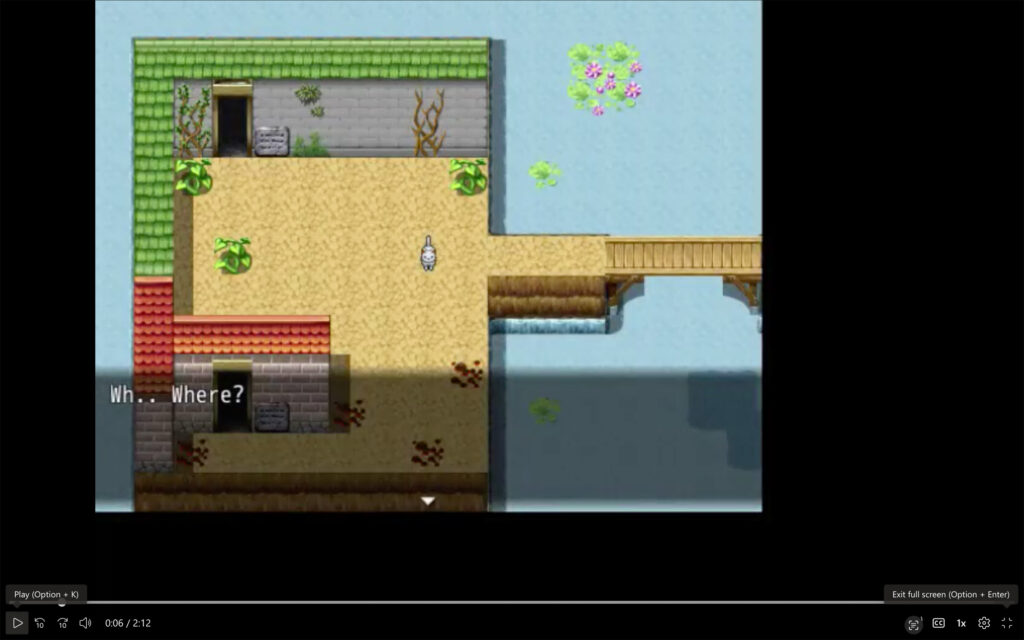
Top: A Screen Capture of Shamanth Joshi’s “Felt Bibliography” transdisciplinary inquiry by Shamanth Joshi (2021). Image courtesy of Kush Patel.
Bottom: Opening Scene of Shamanth Joshi’s video game entitled “There’s Always Room to Be You” as an outcome of their Capstone project entitled, “Queer Reimagination of Digital Role-Playing Games” (2022) [Private]. Image courtesy of Shamanth Joshi.
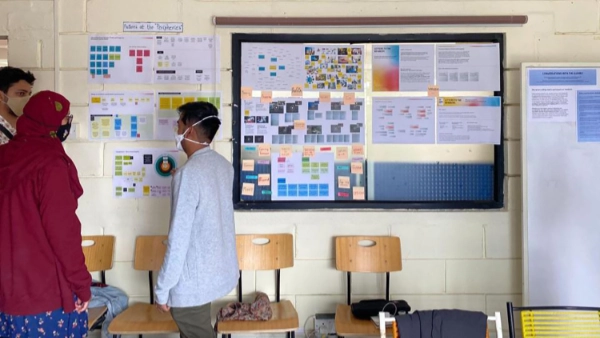
Inquiries into the Futures at the Peripheries Project and Presentation by Vikash Raj (December 2021). Vikash (and Pragya Sinha) produced methodological reflections on elderly individuals’ engagements with and notions of digital technology, or what digital-tech and digital tech-led futures means to them—and in the process, they questioned prevalent terms like the digital native. Image courtesy of Kush Patel
Recent Courses: Seminars and Studios
⦁ Feminist and Queer Worldmaking, PhD Seminar, February–May 2024, 2025
⦁ Archival Activism, MA Seminar, September–October 2024
⦁ The Future as Techno-Utopia, Community, and Technological Self, MA Seminar, January–April 2024
⦁ Gender and Technology, MA Seminar, August–October 2023
⦁ Care Matters and Justice Dreams, The Measure of All Things: Quantifying the Human, MA Studio I, II, III, September–October, 2021, 2022, 2023
⦁ If Technology Will Not Save Us, What Will? The Future of Human and Digital, MA Seminar, January–April 2023
⦁ Introduction to Digital Storytelling Committed to Anti-Colonialism, MAHE Summer School, 2022
⦁ Letters to Futures: Just Design Writing, The Future of Human and Digital, MA Seminar, January–April 2022
⦁ Decolonizing Design, MA Seminar, September–November 2021, 2022

